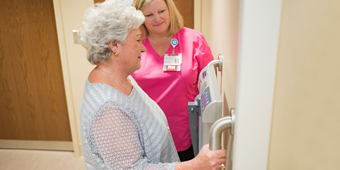Does My Little Girl Have Turner Syndrome?

Answer a few questions and we'll provide you with a list of primary care providers that best fit your needs.
Turner Syndrome is a rare genetic disorder that affects about 1 in 2,500 newborn girls. While females typically have two X chromosomes, those with Turner Syndrome have one normal X chromosome and the second one is either missing or altered in some way.
What Are the Symptoms?
The symptoms of Turner Syndrome are not the same in everyone. Some of the more common symptoms are:
- Short stature
- Hormone therapy needed to undergo puberty
- Inability to conceive
About 30 percent of those affected have these symptoms:
- Extra folds of skin on neck
- Low hairline in back
- Puffy hands and feet
Most girls and women with Turner Syndrome have normal intelligence.
Turner Syndrome can be diagnosed with a blood test, but it is not a routine test performed on newborns.
What Are the Possible Health Concerns For Females With Turner Syndrome?

- Hearing loss
- Chronic middle ear infections
- Abnormalities of the heart, liver and kidneys
- Autoimmune disorders, such as underactive thyroid and celiac disease
- Problems with planning, multi-tasking, focusing and remembering
- Difficulty with spatial awareness, such as driving or riding a bike
Why Is Early Diagnosis Important?
Although the symptoms are different in everyone with Turner Syndrome, some of the challenges that result from it are treatable. That’s why the earlier it’s diagnosed, the better. If the female has kidney or heart problems, for example, or developmental delays, it’s best to begin treatment as early as possible. Turner Syndrome can be diagnosed with a blood test, but it is not a routine test performed on newborns.
What Causes Turner Syndrome?
Most cases are not inherited. There is nothing that either parent did before or at the start of the pregnancy that caused or increased the risk of their child getting Turner Syndrome. The age of a parent, ethnicity, diet, or other factors are not related to their child being born with Turner Syndrome.
What Is Monosomy X and Mosaicism?
These are variations of Turner Syndrome. About half of the females with Turner Syndrome have Monosomy X. This means each cell in their body has only one X chromosome. In other females, only some of their chromosomes are altered. This is known as mosaicism.
Answer a few questions and we'll provide you with a list of primary care providers that best fit your needs.
Source: National Institutes of Health; Turner Syndrome Society of the United States; National Organization for Rare Disorders




